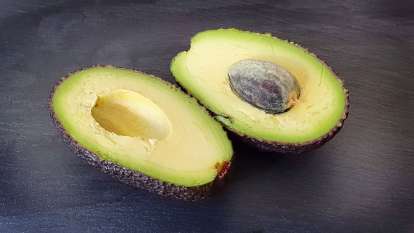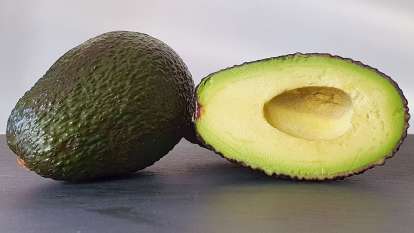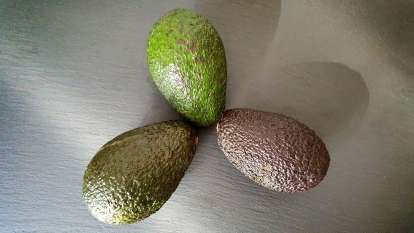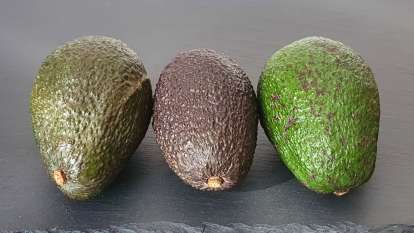Avocado
Avocado and its health benefits
With over 20 vitamins and minerals in its composition, avocado is an excellent source of monounsaturated fatty acids (fats beneficial to the body) and has anticancer, detoxifying and antimicrobial effect. Include it in your diet to protect yourself from heart disease, improve your digestion and regulate your blood cholesterol levels.
The fruit of the avocado tree, which grows in warm climate areas, has a creamy texture and is rich in vitamins, nutrients and monounsaturated fatty acids. Moreover, avocado is considered the most important natural source of "good" fats. The benefits of avocado fruit include improved digestion, protection against cancer and decreased risk of developing depressive states.
Types of avocado
There are several kinds of avocados, which differ in shape and size. The most common type of avocado, also marketed in our country, is avocado hass, also known as "alligator pear" due to the specific texture of the shell, similar to crocodile skin. This type of avocado is dark when ripe, has pear shape, and the hard and textured peel is easily cut off from the creamy interior. The middle seed is spherical and medium-sized.
Another very popular type of avocado is avocado fuerte, which is grown mostly in California. This avocado has green peel, smooth pear-shaped, but larger in size than avocado hass. The seed of this type of avocado is heart-shaped.
Nutritional profile of avocado fruit
Regardless of the type of avocado, nutrition specialists believe that this fruit is a superfood, due to its content of vitamins, minerals and fatty acids beneficial for health. In 100 grams of avocado are found:
Nutritional values
- 60 calories
- 2 g protein
- 15 g monounsaturated fats (beneficial)
- 9 g carbohydrates of which 7 g are fiber
- 26% RDD vitamin K
- 20% RDD folate
Vitamins
- 17% RDD vitamin C
- 14% potassium DZR
- 14% RDD vitamin B5
- 13% RDD vitamin B6
- 10% RDD vitamin E
In addition, avocado contains smaller amounts of magnesium, manganese, copper, iron, zinc, phosphorus and vitamins A, B1 (thiamine), B2 (riboflavin) and B3 (niacin).
Avocado does not contain cholesterol or sodium and high fiber intake in relation to carbohydrates make this fruit a "low-carb" food, which can be used inclusively by dieters or trying to lose weight. Even though most of the calories in avocado come from fats, they are healthy fats that help the body perceive the feeling of satiety. These healthy fats help metabolize carbohydrates and maintain optimal blood sugar levels.
Health benefits of avocado fruit
With over 20 vitamins and minerals in your composition, avocado is a fruit that should not be missing from your diet. Beneficial fats in avocados help regulate blood glucose, preventdiabetes, accelerate the body's immune response and protect the skin and hair. Here are the best known health benefits of avocado:
- Protects the cardiovascular system. Avocado contains a vegetable sterol called beta-sitosterol. For every 30 grams of avocado consumed, you consume about 25 milligrams of beta-sitosterol. This substance protects the health of the cardiovascular system. In addition, the high potassium content (higher than in bananas) prevents the occurrence of vascular accidents and infarction.
- Lowers cholesterol and triglycerides. Also related to the health of the cardiovascular system, avocado has important effects in regulating cholesterol and triglycerides in the blood. These two substances constitute risk factors for the development of heart disease. Recent studies have shown that at people who frequently consume avocado, bad cholesterol (LDL) levels decreased by 20%, as did triglyceride levels. At the same time, good cholesterol (HDL) levels increased by 11%.
- Improves vision. Avocado contains lutein and zeaxanthin, two phytonutrients that are found in the eye tissue, with antioxidant role, and protects the eyes from the effect of UV rays. Monounsaturated fats in avocados support the absorption into the body of beta-carotene, another powerful antioxidant that prevents macular degeneration, a disease that occurs with age and affects central vision.
- Prevents osteoporosis. Vitamin K is essential for bone protection and health, and 100 grams of avocado provides a quarter of the recommended daily dose. A diet rich in vitamin K supports the health of the bone system by increasing the ability to absorb calcium and reducing the amount of calcium eliminated through the urine.
- Prevents cancer. The consistent intake of folate from avocado protects against cancer of the colon, stomach or pancreas. Researchers believe that folate prevents AND or RNA mutations during cell division, thus preventing the development of tumors. In addition, certain phytonutrients in avocado can stop the development of precancerous or even cancerous cells and encourage the development of lymphocytes, which play a role in the immune system.
- Reduces the risk of depression. Folate-rich foods, such as avocado, lower the risk of depression. Folate prevents the accumulation of homocysteine, a substance that can block the delivery of certain nutrients to the brain. High levels of homocysteine interfere with the production of serotonin, dopamine and norepinephrine, the hormones that regulate mood, sleep and well-being.
- Improves digestion. Although it has a creamy texture, avocado is rich in fiber. Thus, regular consumption of avocado prevents constipation, maintains the health of the digestive tract and reduces the risk of developing colon cancer.
- Natural detoxifier. Fiber intake supports a healthy digestion, which ensures the daily elimination of toxins from the body.
- Strengthens the immune system. Through its intake of vitamins, antioxidants and fiber, avocado supports the immune system and fight inflammation in the body.
- Treats the symptoms of osteoporosis. Avocado contains some substances called saponins, known to have a calming effect in knee pain in osteoarthritis and osteoporosis.
- Antimicrobial effect. Avocado contains substances that have an antimicrobial effect, especially against Escherichia coli bacterium.
- Helps control weight. Due to its nutritional profile, avocado can be incorporated into the diets of those who want to lose weight healthily.
Contraindications
Although avocado is considered a superfood, there are a few situations where it is good to consume it carefully:
- In pregnancy or during lactation, because it can affect milk production.
- People with allergies may develop reactions on the skin or at the mouth.
- Oils extracted from certain types of avocados, such as the Mexican one, can affect people already suffering from liver disease.
- Excess consumption can lead to blood thinning.
- People taking anticoagulants (wafarin) should talk to their doctor about avocado consumption.
How to consume avocado
Choose a ripe avocado so you can prepare it easily and enjoy all its benefits. You can tell if the fruit is ripe, gently pressing the peel with your finger. If it is firm and resists, then the fruit is not ripe. Avocado should be soft if you want to use it as sauce or harder if you put it in a salad. You can speed up the baking process if you put it in a paper bag next to a banana.
Here are the easiest ways to consume avocado:
- Put on toast instead of butter.
- Mixed with tomatoes, garlic and lemon juice, as guacamole sauce.
- Cut into slices and put in salads.
- As a base for sauces or smoothies.
Avocado oil can be used for cooking or for cosmetic masks for face or hair.
In conclusion, consumed in moderation, avocado is an extremely beneficial fruit for the body, being a natural source of monounsaturated fats, vitamin K, C and folic acid. Its properties include regulating digestion and cholesterol in the blood, protecting against cancer and heart disease. In addition, due to its high intake of fiber in relation to carbohydrates, it can be consumed by people who want to lose weight healthily.
Summary
Beneficial effects:
- Antioxidant
- Anticancer
- Digestive protector
- Anti-inflammatory
- Antimicrobial
- Adjusts cholesterol
- Detoxifier
Side effects:
- Pregnancy and breastfeeding
- Allergies
- Liver disease
- Anticoagulants.





Comments